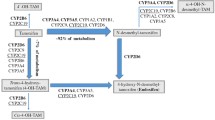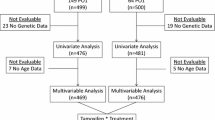Abstract
Active metabolites of tamoxifen are formed mainly by the action of cytochrome P450 2D6 (CYP2D6). Since there are controversies regarding associations between CYP2D6 polymorphisms and outcomes among women with early breast cancer (EBC) treated with tamoxifen, the present evaluation of links with clinical outcomes was conducted. We analyzed a total of 716 patients treated with tamoxifen for hormone receptor positive EBC between 2001 and 2005 at the National Cancer Center, Korea. All patients received tamoxifen 20 mg/day for more than 6 months. DNA obtained from whole blood samples was genotyped for CYP2D6 variants associated with reduced (*10, *41) and absent (*5) activity. Of the total of 716 patients, 558 (77.9%) received adjuvant or neoadjuvant chemotherapy prior to the tamoxifen therapy. From the genotyping of CYP2D6, 152 (21.2%) patients were classified as having the wild type (W/W), 376 (52.7%) one variant allele (W/V), and 188 (26.1%) two variant alleles (V/V). Seventy (9.8%) patients experienced disease recurrence with a median follow-up of 5.6 (range, 0.6–10.3) years. Although known prognostic factors, including tumor size, nodal status, Ki67, PgR negativity, and HER2 positivity showed strong associations with the recurrence free survival (RFS) in this population, no significant association with any of the CYP2D6 genetic variants was evident (P = 0.61; hazard ratio [HR] = 1.14; 95% CI 0.68–1.92). This remained the case after subgroup analysis according to different adjuvant treatments. Polymorphisms of CYP2D6 were not associated with clinical outcomes in EBC patients receiving adjuvant tamoxifen treatment.



Similar content being viewed by others
Abbreviations
- ER:
-
Estrogen receptor
- PgR:
-
Progesterone
- CYP2D6:
-
Cytochrome P450 2D6
- AIs:
-
Aromatase inhibitors
- RFS:
-
Recurrence free survival
References
Jordan VC, Collins MM, Rowsby L, Prestwich G (1977) A monohydroxylated metabolite of tamoxifen with potent antioestrogenic activity. J Endocrinol 75(2):305–316
Tan SH, Lee SC, Goh BC, Wong J (2008) Pharmacogenetics in breast cancer therapy. Clin Cancer Res 14(24):8027–8041
Jin Y, Desta Z, Stearns V, Ward B, Ho H, Lee KH, Skaar T, Storniolo AM, Li L, Araba A et al (2005) CYP2D6 genotype, antidepressant use, and tamoxifen metabolism during adjuvant breast cancer treatment. J Natl Cancer Inst 97(1):30–39
Bradford LD (2002) CYP2D6 allele frequency in European Caucasians, Asians, Africans and their descendants. Pharmacogenomics 3(2):229–243
Lim HS, Ju Lee H, Seok Lee K, Sook Lee E, Jang IJ, Ro J (2007) Clinical implications of CYP2D6 genotypes predictive of tamoxifen pharmacokinetics in metastatic breast cancer. J Clin Oncol 25(25):3837–3845
Kiyotani K, Mushiroda T, Sasa M, Bando Y, Sumitomo I, Hosono N, Kubo M, Nakamura Y, Zembutsu H (2008) Impact of CYP2D6*10 on recurrence-free survival in breast cancer patients receiving adjuvant tamoxifen therapy. Cancer Sci 99(5):995–999
Kiyotani K, Mushiroda T, Imamura CK, Hosono N, Tsunoda T, Kubo M, Tanigawara Y, Flockhart DA, Desta Z, Skaar TC et al (2010) Significant effect of polymorphisms in CYP2D6 and ABCC2 on clinical outcomes of adjuvant tamoxifen therapy for breast cancer patients. J Clin Oncol 28(8):1287–1293
Schroth W, Goetz MP, Hamann U, Fasching PA, Schmidt M, Winter S, Fritz P, Simon W, Suman VJ, Ames MM et al (2009) Association between CYP2D6 polymorphisms and outcomes among women with early stage breast cancer treated with tamoxifen. JAMA 302(13):1429–1436
Nowell SA, Ahn J, Rae JM, Scheys JO, Trovato A, Sweeney C, MacLeod SL, Kadlubar FF, Ambrosone CB (2005) Association of genetic variation in tamoxifen-metabolizing enzymes with overall survival and recurrence of disease in breast cancer patients. Breast Cancer Res Treat 91(3):249–258
Newman WG, Hadfield KD, Latif A, Roberts SA, Shenton A, McHague C, Lalloo F, Howell S, Evans DG (2008) Impaired tamoxifen metabolism reduces survival in familial breast cancer patients. Clin Cancer Res 14(18):5913–5918
Okishiro M, Taguchi T, Jin Kim S, Shimazu K, Tamaki Y, Noguchi S (2009) Genetic polymorphisms of CYP2D6 10 and CYP2C19 2, 3 are not associated with prognosis, endometrial thickness, or bone mineral density in Japanese breast cancer patients treated with adjuvant tamoxifen. Cancer 115(5):952–961
Lash TL, Lien EA, Sorensen HT, Hamilton-Dutoit S (2009) Genotype-guided tamoxifen therapy: time to pause for reflection? Lancet Oncol 10(8):825–833
McShane LM, Altman DG, Sauerbrei W, Taube SE, Gion M, Clark GM (2006) Reporting recommendations for tumor marker prognostic studies (remark). Exp Oncol 28(2):99–105
Sohn DR, Shin SG, Park CW, Kusaka M, Chiba K, Ishizaki T (1991) Metoprolol oxidation polymorphism in a Korean population: comparison with native Japanese and Chinese populations. Br J Clin Pharmacol 32(4):504–507
Sistonen J, Fuselli S, Levo A, Sajantila A (2005) CYP2D6 genotyping by a multiplex primer extension reaction. Clin Chem 51(7):1291–1295
Gaedigk A, Gotschall RR, Forbes NS, Simon SD, Kearns GL, Leeder JS (1999) Optimization of cytochrome P4502D6 (CYP2D6) phenotype assignment using a genotyping algorithm based on allele frequency data. Pharmacogenetics 9(6):669–682
Allred DC, Harvey JM, Berardo M, Clark GM (1998) Prognostic and predictive factors in breast cancer by immunohistochemical analysis. Mod Pathol 11(2):155–168
Gnant M, Mlineritsch B, Schippinger W, Luschin-Ebengreuth G, Postlberger S, Menzel C, Jakesz R, Seifert M, Hubalek M, Bjelic-Radisic V et al (2009) Endocrine therapy plus zoledronic acid in premenopausal breast cancer. N Engl J Med 360(7):679–691
Rastelli F, Crispino S (2008) Factors predictive of response to hormone therapy in breast cancer. Tumori 94(3):370–383
Lash TL (2010) Association between CYP2D6 polymorphisms and breast cancer outcomes. JAMA 303(6):516 (author reply 517)
Seruga B, Amir E (2010) Cytochrome P450 2D6 and outcomes of adjuvant tamoxifen therapy: results of a meta-analysis. Breast Cancer Res Treat 122(3):609–617
Rae JM, Sikora MJ, Henry NL, Li L, Kim S, Oesterreich S, Skaar TC, Nguyen AT, Desta Z, Storniolo AM et al (2009) Cytochrome P450 2D6 activity predicts discontinuation of tamoxifen therapy in breast cancer patients. Pharmacogenomics J 9(4):258–264
Dezentje VO, Van Schaik RH, Vletter-Bogaartz JM, Wessels JA, Hille ET, Seynaeve C, Van De Velde CJ, Nortier JW, Gelderblom H, Guchelaar H (2010) Pharmacogenetics of tamoxifen in relation to disease-free survival in a Dutch cohort of the tamoxifen exemestane adjuvant multinational (TEAM) trial. J Clin Oncol 28(Suppl 15):abstract 510
Bratherton DG, Brown CH, Buchanan R, Hall V, Kingsley Pillers EM, Wheeler TK, Williams CJ (1984) A comparison of two doses of tamoxifen (Nolvadex) in postmenopausal women with advanced breast cancer: 10 mg bd versus 20 mg bd. Br J Cancer 50(2):199–205
Decensi A, Robertson C, Viale G, Pigatto F, Johansson H, Kisanga ER, Veronesi P, Torrisi R, Cazzaniga M, Mora S et al (2003) A randomized trial of low-dose tamoxifen on breast cancer proliferation and blood estrogenic biomarkers. J Natl Cancer Inst 95(11):779–790
Kisanga ER, Gjerde J, Guerrieri-Gonzaga A, Pigatto F, Pesci-Feltri A, Robertson C, Serrano D, Pelosi G, Decensi A, Lien EA (2004) Tamoxifen and metabolite concentrations in serum and breast cancer tissue during three dose regimens in a randomized preoperative trial. Clin Cancer Res 10(7):2336–2343
Acknowledgments
This study was supported by NCC Grant 0910320.
Conflicts of interest
The authors declared that they have no competing interests.
Author information
Authors and Affiliations
Corresponding author
Rights and permissions
About this article
Cite this article
Park, I.H., Ro, J., Park, S. et al. Lack of any association between functionally significant CYP2D6 polymorphisms and clinical outcomes in early breast cancer patients receiving adjuvant tamoxifen treatment. Breast Cancer Res Treat 131, 455–461 (2012). https://doi.org/10.1007/s10549-011-1425-2
Received:
Accepted:
Published:
Issue Date:
DOI: https://doi.org/10.1007/s10549-011-1425-2




